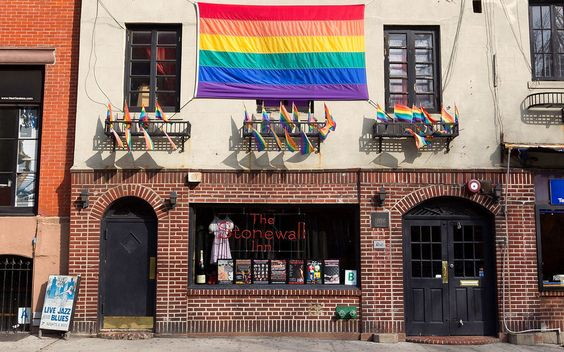
The #BlackLivesMatter protests which rocked the world this month are not the first of their kind. But this year, the movement’s intersection with Pride Month—a time typically associated with celebration of sexuality and gender identity—warrants special consideration.
There are some within the LGBTQ+ community who have spoken vocally against the BLM protests or at least what they perceive to be its “taking over” of a month of historical significance to them. This group is overwhelmingly white, cisgender, and middle to upper-class men; in other words, they are the part of the community with the closest proximity to the same institution which punishes their less privileged peers for standing out.
What nonblack queer people who insist on playing respectability politics in the face of atrocities fail to realise, however, is that movements for the rights, freedoms and protections of black people and the LGBTQ+ community have never been totally distinct. In fact, the recent history of LGBTQ+ rights in the West has everything to do with preceding civil rights movements, and the involvement of black and brown queer women.
When people say “I wish Pride was just about love and equality”, they’re buying into the fallacy that love and equality can exist in the absence of struggle. And it has been an uphill struggle for the LGBTQ+ community since the very beginning; sometimes it seems as though this slope will never end. Marriage equality has only existed in the USA since 2015. Only last year did Taiwan become the first state in Asia to legalise gay marriage, and just this month, Hungary passed a bill prohibiting the recognition of gender identity not aligned with biological sex. LGBTQ+ people are under threat worldwide. In countries like Brunei, acts and lifestyles adjacent to “sodomy” can be punished by stoning. Poland’s President Andrzej Duda, who is currently leading in the election polls, has promised to prohibit same-sex marriage and gay adoption if he is re-elected. The Trump administration only recently rolled back protections of transgender and gender-non-conforming people in healthcare. And in the Philippines this week, the arrests of at least twenty LGBTQ+ activists and protestors were made at the Manila Pride March despite the marchers adhering to social distancing rules and having full right to assembly.
So no, our fight is far from over. We are not free until all of us are free, and in the West, where Pride came from, this fight has been possible to sustain this long and this successfully only at the sacrifice and activism of countless—many nameless and forgotten—black and brown LGBTQ+ women on the frontlines.

In every online space this month, you may have heard something to this effect: “Pride started off as a riot.” This is in reference to the Stonewall Riots, a wave of civil unrest in response to the riots at Stonewall Inn in Greenwich, Manhattan. When police raided the Stonewall Inn on the 28th of June, 1969, it was the black butch lesbian and drag king Stormé DeLarverie who asked its occupants while being marched into a police-wagon, bleeding from a police-inflicted head wound, “Why don’t you guys do something?” A newly emboldened crowd rose up. The riots went on for days, and by the end of it, a movement had emerged: one which would continue to fight for the rights of LGBTQ+ people well into the future.

Among the most outspoken champions of this early LGBTQ+ rights movement were black and brown transgender women like Marsha P. Johnson and Sylvia Rivera, drag queens who participated in marches, founded organisations like the Gay Liberation Front and Street Transvestite Action Revolutionaries (S.T.A.R.) and worked tirelessly to help keep poor and working-class gay and trans people warm and fed. Johnson was referred to by many as “the mayor of Christopher Street” for her unwavering dedication to supporting LGBTQ+ youth on the Christopher Street docks. Similarly, the earlier mentioned Stormé DeLarverie was known as the “guardian of the lesbians in the Village” for her part in prowling the streets of Greenwich at night, protecting any of her “baby girls” from abuse or assault.
If any of these women had chosen civility, had chosen respectability politics in the face of crisis, the contemporary LGBTQ+ rights movement could be centuries behind where it is today. But they didn’t. They didn’t have a choice, either. To be black, trans and gay all at once as was true for many of these people is to be an “other” unequivocally. to be policed your entire life (you’re too loud, you’re too angry, you’re too you), to exist at the intersection of multiple axes of oppression where standing on one is already enough to get you killed. And yet they were loud, they were loving, and they were violent. Pride is what it is today because of them.
So, nonblack LGBTQ+ people, before you mourn the parades or the flashy outfits this year, or type out essays on how sad you are that Pride is being written off by the media in favour of the riots, consider this: not doing that. Pride would not exist without the Black Lives Matter movement; our fights are inextricably intertwined. Those who refuse to acknowledge the labour done over decades by black and brown women are choosing to stay on the sidelines. We are not free until all of us are free.
Stormé DeLarverie. Marsha P. Johnson. Sylvia Rivera. Remember their names, and remember all those alongside them who fought to give us our right to celebrate this month.

“History isn’t something you look back at and say it was inevitable, it happens because people make decisions that are sometimes very impulsive and of the moment, but those moments are cumulative realities.”
— Marsha P. Johnson